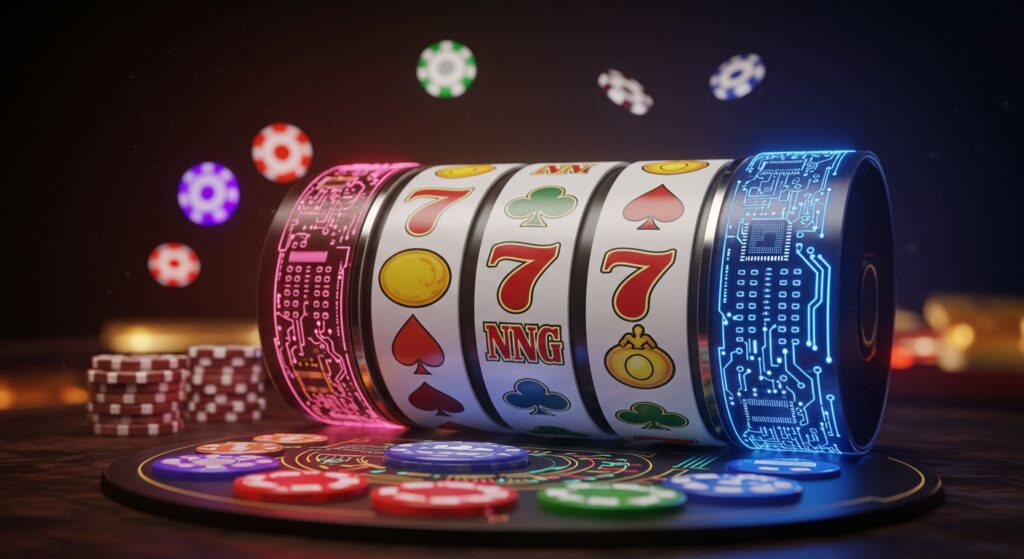If you’ve ever sat in front of a slot machine — whether in a casino or online — you’ve probably wondered if those spinning reels are really fair. After all, it can feel like the machine “knows” when you’re about to win or lose. Sometimes it rewards you instantly, and other times it drains your balance in minutes. This question has sparked endless debate: are slot machines truly random, or are they subtly programmed to win less?
The answer isn’t as simple as “yes” or “no.” To understand how slot machines work, you need to know what randomness means in the world of gambling and how technology shapes the odds behind the scenes.
How Random Number Generators Control Every Spin
Every slot machine — online or physical — runs on a technology called a Random Number Generator (RNG). The RNG is a computer program that continuously produces thousands of random number sequences per second, even when no one is playing. Each number corresponds to a specific symbol combination on the reels. When you hit the “spin” button, the RNG stops at that exact moment, selecting a combination that determines your result.
That means there’s no pattern, no memory, and no way for the slot to “know” who’s playing or how much you’ve bet. Each spin is independent of the last — just like flipping a coin. This is what makes slots fair, at least in theory.
However, the term “random” can be misleading. The RNG is programmed to simulate randomness through algorithms, not pure chance. While you can’t predict an outcome, the system is designed around probabilities — and those probabilities are what define the house edge.
The Role of Return to Player (RTP) and House Edge
Slot machines are business tools for casinos. To stay profitable, they need to ensure that, over time, the house makes slightly more than it gives away. This is where RTP (Return to Player) and house edge come in.
The RTP is the theoretical percentage of total bets that a slot machine pays back to players over time. For example, if a game has an RTP of 96%, that means that for every $100 wagered, players can expect to win back around $96 on average. The remaining 4% is the house edge — the casino’s built-in profit margin.
It’s important to understand that RTP doesn’t apply to short-term sessions. You might win a big jackpot after just a few spins or lose steadily despite the 96% promise. The math only balances out after millions of spins. In that sense, the game is random per spin but programmed to maintain profitability over the long term.
What Happens at Non GamStop Casinos
In the UK, licensed online casinos are regulated by the UK Gambling Commission, which ensures that every slot game is tested for fairness. But many players also explore non gamstop casinos — gambling sites based outside the UK regulatory system. These platforms are not part of the GamStop self-exclusion program, allowing players who’ve opted out of UK casinos to play again if they choose to.
Non-GamStop casinos operate under different jurisdictions, such as Curaçao, Malta, or Gibraltar. Many of them also feature RNG-tested slots, but not all are held to the same transparency standards as UKGC-licensed sites. This means while you might still get genuine random results, the oversight mechanisms that guarantee fairness — like regular audits and published RTP reports — can vary significantly.
Some players prefer these casinos because they offer larger bonuses, faster verification, and fewer restrictions. However, when it comes to randomness and fairness, trust depends on whether the site’s software is certified by independent auditors like eCOGRA or iTech Labs. Without such verification, there’s always a risk that RNGs could be poorly implemented or manipulated.
Why People Believe Slots Are Rigged
It’s easy to see why players sometimes believe slot machines are “programmed to win less.” You can spend hours spinning reels without a major payout, only to watch someone else hit a jackpot moments later. But this perception often comes down to the way randomness feels in practice.
Humans are wired to find patterns — it’s how our brains make sense of chaos. When a machine behaves unpredictably, our instinct is to look for hidden causes. We might assume that casinos tighten or loosen slots depending on time of day or player activity. In reality, that’s not how it works for licensed operators. The RNG doesn’t adjust based on your history or how much you’ve lost; it just continues generating random outcomes.
However, there are unethical casinos that manipulate software to reduce win frequencies. These are rare in regulated markets but more likely to appear in unlicensed or poorly monitored environments. This is why choosing a trusted, verified casino is essential if you want to ensure your experience is fair.
The Mathematics Behind the “Illusion of Control”
Slot games are carefully designed to create a feeling of suspense and near-miss excitement. Ever notice how the third reel often stops just one symbol away from a winning line? That’s not coincidence — it’s psychology. Developers use near-miss algorithms to make spins feel more engaging. While the outcome itself is random, the display of near-wins triggers dopamine in the brain, encouraging players to keep spinning.
This is one reason why slot machines are sometimes called “psychological machines.” They create an illusion of control, even when none exists. Whether you stop the reels early, bet higher amounts, or switch machines, your actions don’t influence the RNG. Each spin’s outcome is locked in the moment you press the button.
That said, this doesn’t mean slots are rigged — it means they’re designed for entertainment and profit. Every flashing light, sound effect, and spin animation serves to enhance engagement, not to alter randomness.
Online vs. Physical Slots: Any Difference?
Many players believe that physical casino slots are more random or fairer than online versions. In truth, both use RNG technology — the difference lies in where it’s hosted. Physical slots have RNG chips built into their hardware, while online slots use server-based RNG systems that are regularly audited.
The main advantage of online casinos is transparency. Reputable operators publish game RTPs and even allow independent verification through third-party testing agencies. In contrast, land-based machines may not display detailed information to players, though they’re still subject to state or local regulations.
If you’re playing at a reliable platform — whether physical or digital — the randomness should be identical. The key is always the casino’s licensing and the credibility of its software provider. Established names like NetEnt, Microgaming, or Playtech are known for fair RNG mechanics and clear payout data.
Can Casinos Change the Odds?
Legitimate casinos cannot simply change the odds or RTP of a slot game without re-certification from regulators. The process involves code-level audits, checksum verification, and sometimes re-approval of the entire software build. This makes tampering extremely difficult for licensed casinos.
However, some operators — especially offshore or unregulated ones — may use pirated or modified versions of popular games. These clones might look identical to legitimate slots but use altered payout algorithms. Such manipulation is why players must always verify the authenticity of the casino and its software source.
One practical tip is to check the game developer’s official site to see if the casino is listed as an authorized partner. This simple step can help you avoid playing on sites that use fake or tampered software.
The Bottom Line: Random, But Not Equal
So, are slot machines truly random or programmed to win less? The truth lies somewhere in between. Each spin is independently random, thanks to the RNG, but the overall structure of the game ensures that, statistically, the house maintains a small but consistent advantage. This balance keeps the industry profitable while giving players a genuine — albeit slim — chance at big wins.
In reputable casinos, randomness and fairness go hand in hand because both the RNG and RTP are publicly verified. In shady or unregulated environments, that trust can disappear. This is why understanding how slot mechanics work — and where you play — is just as important as luck itself.
If you approach slot gaming with knowledge and realistic expectations, you’ll see that the thrill comes not from beating the system, but from enjoying the unpredictability of every spin. Random doesn’t mean rigged — it means uncertain, and that uncertainty is what makes gambling exciting.











